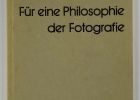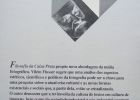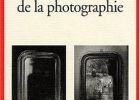The Fantastic & Fictionalism in Flusser’s “Now Suppose”
In his essay “Now Suppose”, Vilém Flusser proposes two methods that can be used to anticipate future events: an analogue approach of “standing-on-tip-toes” to evaluate broader trends and possibilities, and a digital approach of “finger-tips-at-terminals” utilizing probabilistic technology for future prediction. This essay explores the use of different technologies, such as scientific lab equipment, big-data algorithms, and digital production tools, as examples of these ‘Futurizing Instruments.’ Flusser’s concept is related to Hans Vaihinger’s fictionalism and Tzvetan Todorov's study of the fantastic, as both provide insights into the role of imagination and uncertainty in anticipating future events. Connected to Flusser’s philosophy of photography and the concept of the technical apparatus this essay proposes a history of media technologies in ancient ritual, art, theater, cinema, and computer media, back into Magic/Ritual – and their potential for both entertainment and future anticipation. Incorporating ideas from Flusser’s other two essays “The Novel Called ‘Science’” and its parallel with the movement through the fantastic by way of fictionalism, and “Gestures on Videotape (for Fred Forest)” describing the validity of using video (and possibly even some fantastical or science fiction elements) to reinforce the material and theoretical concepts – portions of “Now Suppose” are reimagined and presented as video and film scripts, particularly his concept of a ‘terrorist jumping from a monitor’. Flusser explores the use of video as a medium to communicate concrete phenomena and theoretical concepts. This approach requires a balance between scientific fictionalism and literary fantasy.
Für eine Philosophy of Caixa Preta. Analyse textuelle critique des différentes versions du livre de Vilém Flusser Pour une Philosophie de la Photographie et petite histoire de ses éditions
Towards a Philosophy of Photography was written by Flusser in three different languages, and there are important differences between the texts in German and English, and the text in Portuguese: the latter puts more emphasis on the black box and spells out that photography is a pretext to study the apparatus. However, all translations without exception were made from the German and English versions and therefore do not do justice to the development of Flusser's thinking in 1985 when he wrote the Portuguese version. Based on a textual analysis of these different editions and of the third-party translations (a critical approach so far little applied to Flusser's books), this essay suggests combining the different versions written by Flusser to arrive at a comprehensive text reflecting better his thinking. In doing so, it raises the question of power and languages, and proposes some principles to confront it.
Flusser, Media Theory and I. From the Genealogy of Thought
This essay is a case study of a coincidence both in terms of a personal perspective of the author’s encounter with Vilém Flusser’s philosophical and theoretical thought, and with regard to notions of necessity, destiny, and fate. In the present essay, this type of randomness is called ‘primordial accidentalism’. The author discusses his experiences in applying Flusser’s concepts of apparatus, alphanumeric society and technical images, to the creation of concepts referring to digital photography, new media, new media art, cyber-culture and techno-culture. Moreover, the author recalls his experiences with the two Polish editions of Towards a Philosophy of Photography (2004 and 2015), which undoubtedly contributed to the popularization of Flusser’s philosophical concepts among artists, media theorists and philosophers.
Flusser and the Polish (Photography) Novels
Reading Polish photographic novels through Flusser presents an expression that metaphorically depicts the principal aim of this essay. Vilém Flusser’s Towards a philosophy of photography is one of the crucial theoretical texts for current work in the field of comparative literature. Flusser’s theories are key for understanding the phenomenon of intermediality, which consists of the relations between photography and literature. This essay explains why, how, and in which type of novels Flusser’s theory is sustainable and relevant for intermedial analysis. Two Polish novels were chosen for this interpretation: “Pamiętnik diabła” by Irek Grin and “Fototerapia” by Katarzyna Sowula. The novels reflect on Flusser’s concepts in several ways, as well as on the analysis of the problems of photographic ethics and aesthetics involved in their narration. In the essay, Markowska focuses on the following issues present in the narratives of the novels: a photographer as literary character, ethical responsibilities of documentary photography, the book as a new medium, that is, the textual and visual reproduction of images within the literary art work. The analytical part is preceded by a theoretical introduction explaining Flusser’s photographic theory and the philosopher’s dialogue with ideas by Walter Benjamin, Susan Sontag and Roland Barthes.


